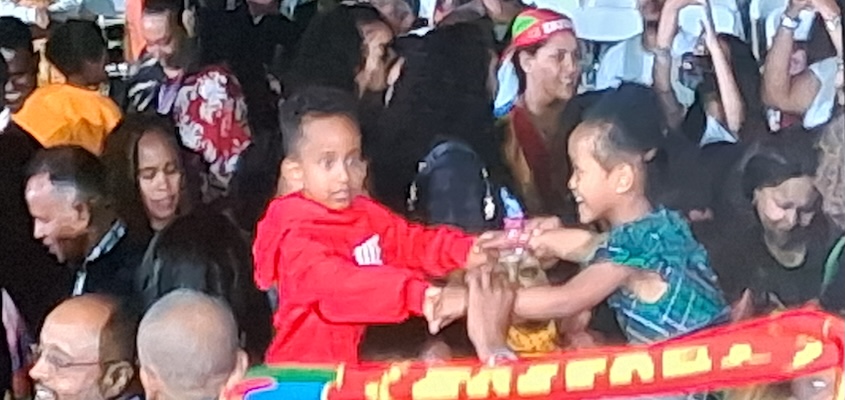Eritrea: We Won’t Kneel Down
TRANSCEND MEMBERS, 11 Aug 2025
Ann Garrison | Black Agenda Report – TRANSCEND Media Service

Eritrean Americans celebrated their 51st Eritrean Festival and their home country’s resolute independence from August 1 to 3, 2025.
6 Aug 2025 – This year’s US Eritrean Festival was held in Stockton, California. Eritrean Americans were as gregarious and joyful to be together as ever, speaking their native language, Tigrinya, and celebrating their culture. I’m always glad to be their guest, being one of the few Western journalists who writes anything good about this fiercely independent Red Sea nation. I like to think that every year I get a little better at the shimmy shake dance move during the evening concerts.
One thing I love about the Eritreans I meet at their festivals is that most of them make regular trips home and try to find ways to support the country despite extreme, punishing sanctions that make it difficult even to send money to family. I’ve attended festival sessions about raising money for cancer care or care of wounded veterans.
One festival-goer told me that going home is more expensive than going to Hawaii, but he feels at peace there.
In Berkeley, California, I met an Eritrean woman who said she’d sent her teenage kids home for several years to learn the language and culture and avoid the drugs they’d likely be exposed to at Berkeley High.
Eritrea haters often ask why these festival-goers are here instead of back home, and there are several reasons. Many came to the US when Eritrea was still under the yoke of the Ethiopian empire, which ended in 1974, or the repressive Ethiopian Derg regime that ensued from 1974 to 1991. Others fled the 1998 to 2000 proxy war with Ethiopia engineered by US policymakers. In many cases they or their children were born here.
I spoke to an emergency trauma surgeon who returned to train surgeons and pediatric specialists from 2007 to 2012. He told me Eritrea is here to stay short of a nuclear war or wholesale natural disaster.
Others are economic migrants who left because extreme sanctions have simply made life too hard, but they still attend the festivals, love the language and culture, and travel home regularly. Others go home to retire.
One festival-goer told me he thought there would be a great migration home if sanctions were lifted. He said that he himself would like to start a business in Eritrea but sanctions make it all but impossible. Tiffany Hadish, the movie star whose father was Eritrean, attended this year’s festival and told me that she hopes to someday build a resort in Eritrea, but that right now she can’t even wire money to her own bank account there.
Eritreans at the 2022 festival in Dallas gave hundreds of thousands of several million dollars eventually raised for cancer screening equipment for Eritrean medical centers and hospitals. I saw one after another stand up in the audience to announce their contributions, thrilled by the chance to give. Would they do that if they didn’t love Eritrea?
There is, of course, a diaspora that hates the current Eritrean government and its president, Isaias Afwerki, with considerable support from American and European ideologues. They forever complain that Eritrea does not practice electoral democracy, a Western form that global elites use to subvert popular movements in Africa, just as they do here in the US. Never mind that Western governments have arranged the assassination of truly popular elected leaders like Congo’s Patrice Lumumba and Togo’s Sylvanus Olympio.
At this point in time and in Africa, a government should be judged on whether it serves the interests of its people and has their support, not whether it holds elections. The Alliance of Sahel States–Burkina Faso, Mali, and Niger–aren’t holding elections either, but they’ve expelled the French and US militaries and nationalized the country’s natural resources.
Eritrea haters
Eritrea haters include white South African journalist Martin Plaut, who actually urged a diaspora audience to burn an Eritrean Embassy down. Plaut also heroizes Brigade N’Hamedu, an organization of violent hooligans who for several years showed up to violently attack the peaceful Eritrean festivals across Europe, North America, and in Jerusalem. Plaut refers to these violent attacks as “protests” while referring to the wholly peaceful annual gatherings as “militarized propaganda festivals.” The fact that these diaspora Eritreans love their home country and culture seems to have given him an ulcer.
Many of the attackers have been indicted for criminal violence, and some have been sentenced to prison in Europe.
The location of this year’s US festival wasn’t announced until a week ahead of time because of security concerns, but it took place peacefully. Criminal indictments and convictions and legal actions seem to have stopped the violence.
At the 2023 Eritrean Festival in Seattle, Brigade N’Hamedu showed up to tear down exhibition tents, light fires, and even put three festival-goers in the hospital, and the Eritrean Association in Greater Seattle filed a civil complaint against them. Their lawyer appeared at this year’s festival to explain its advance with decisions striking Brigade N’Hamedu’s motion to dismiss and its second, third, fourth, fifth, and sixth affirmative defenses.
One of this year’s festival-goers told me that he challenges Brigade N’Hamedu to hold its own festival in a convention center in another city on the same weekend and let Eritrean Americans choose which to attend. He said they couldn’t attract anything close to the 17,000 Eritrean Americans who attended in Stockton, but let them try. The same 200 rioters, he added, have shown up every time a festival has been attacked in the US.
Michael Rubin of the extreme right-wing American Enterprise Institute is another prominent Eritrea hater. He relentlessly screeches for regime change and has even comically told Eritreans that they could be Rwanda, which last celebrated electoral democracy by awarding its President Paul Kagame, a longtime Western puppet, with a wholly implausible 99.14% percent of the vote. That smashed his earlier records of 93%, 95%, and 98%. Kagame is also in the habit of imprisoning, disappearing, and outright assassinating political opponents at home and abroad .
During the festival it was revealed that President Trump had sent a letter to President Isaias Afwerki on June 30 to say that he is “reversing the negative, harmful damage of the Biden Administration around the globe” and that he would like to re-establish a respectful and productive national relationship between the US and Eritrea “based on honesty, respect, and opportunities to improve peace and prosperity across the Horn of Africa and the Red Sea.”
Eritreans welcomed this cautiously, hoping that sanctions might be lifted when they come up for renewal in September.
One day later three Democratic Senators, California’s Adam Schiff, Delaware’s Chris Coons, and Illinois’s Dick Durbin, introduced a Senate resolution condemning Eritrea. They didn’t suggest any concrete action or any particular reason for introducing this resolution now, and Eritrea could hardly be more sanctioned than it already is, but this may signal their intent to oppose lifting the sanctions when they come up for renewal in September.
For some reason Democrats have always treated Eritrea far more harshly than Republicans.
This year the largest festival meeting hall was filled with Eritrean Americans who’d come to hear a presentation and discussion of a new book of interviews with President Isaias Afwerki conducted by French journalist Michel Collon.The book, published by Investig’Action, is My Struggle for Eritrea and Africa .
In his introduction, Collon writes:
“As soon as it was liberated, Eritrea was put under pressure by the World Bank: ‘We will write your economic programme. Otherwise . . .’ And since that threat, for refusing to submit to Western multinationals, Eritrea has been subjected to every possible form of aggression.” Meaning sanctions, regime change operations, proxy wars, media wars, and even migration wars in which the CIA uses social networks to lure Eritrean youth into the nets of migrant trafficking mafias.
Eritrea has refused to collaborate with the US and NATO’s global security architecture. Eritrea and Zimbabwe are the only two African nations who have refused to collaborate with AFRICOM, the US African Command, since its inception in 2007, but they have since been joined by Burkina Faso, Mali, and Niger.
Eritrea has also nationalized its natural resources, another cardinal sin in the eyes of the West’s corporate states.
It guarantees health care and education, always an example that the US finds intolerable.
Since Eritrea’s initial refusal of World Bank debt dependence, it has pursued a development model with the tortoise as its metaphor: slow and steady, self-reliant, step-by-step.
It even refused to mass vaccinate for COVID because its national COVID council never detected signs of a pandemic. This of course inspired Eritrea haters to howl, “What is this country going to do next???”
At the book session, I took the mic to note that Trump isn’t likely to lift the sanctions for free, that he no doubt wants something, and ask how Eritrea would negotiate. The answer was that Eritrea is not for sale, that its sovereignty is inviolable. “Eritrea won’t kneel down.”
_______________________________________________
 Ann Garrison is an independent journalist based in the San Francisco Bay Area. She attended Stanford University and is a member of the TRANSCEND Network for Peace Development Environment. In 2014 she received the Victoire Ingabire Umuhoza Democracy and Peace Prize for her reporting on conflict in the African Great Lakes region. She can be reached at ann@anngarrison.com
Ann Garrison is an independent journalist based in the San Francisco Bay Area. She attended Stanford University and is a member of the TRANSCEND Network for Peace Development Environment. In 2014 she received the Victoire Ingabire Umuhoza Democracy and Peace Prize for her reporting on conflict in the African Great Lakes region. She can be reached at ann@anngarrison.com
Go to Original – blackagendareport.com
Tags: Africa, Eritrea
DISCLAIMER: The statements, views and opinions expressed in pieces republished here are solely those of the authors and do not necessarily represent those of TMS. In accordance with title 17 U.S.C. section 107, this material is distributed without profit to those who have expressed a prior interest in receiving the included information for research and educational purposes. TMS has no affiliation whatsoever with the originator of this article nor is TMS endorsed or sponsored by the originator. “GO TO ORIGINAL” links are provided as a convenience to our readers and allow for verification of authenticity. However, as originating pages are often updated by their originating host sites, the versions posted may not match the versions our readers view when clicking the “GO TO ORIGINAL” links. This site contains copyrighted material the use of which has not always been specifically authorized by the copyright owner. We are making such material available in our efforts to advance understanding of environmental, political, human rights, economic, democracy, scientific, and social justice issues, etc. We believe this constitutes a ‘fair use’ of any such copyrighted material as provided for in section 107 of the US Copyright Law. In accordance with Title 17 U.S.C. Section 107, the material on this site is distributed without profit to those who have expressed a prior interest in receiving the included information for research and educational purposes. For more information go to: http://www.law.cornell.edu/uscode/17/107.shtml. If you wish to use copyrighted material from this site for purposes of your own that go beyond ‘fair use’, you must obtain permission from the copyright owner.
Join the discussion!
We welcome debate and dissent, but personal — ad hominem — attacks (on authors, other users or any individual), abuse and defamatory language will not be tolerated. Nor will we tolerate attempts to deliberately disrupt discussions. We aim to maintain an inviting space to focus on intelligent interactions and debates.